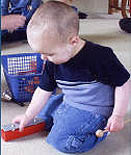|
14602 NE Fourth Plain
Suite H
Vancouver, WA 98682
360-882-0501
[email protected]
Awarded the
Maestro Award
for being in the
top 5% of Kindermusik Programs in the country the past
3 years
|
Benefits of Music Education
As we all know, music can soothe a screaming toddler, however
there is now much research to show that music also enhances
intelligence, coordination, emotional expression, creativity,
and socialization skills.
Don Campbell, author of "The Mozart Effect for Children"
calls music “a power bar for the brain”;
not a frill, but a developmental necessity in early childhood.
|
Music Enhances Intelligence 
Music plays a critical role in the process of “wiring”
the brain from the first days of life.
One study showed that high school students who sang or played
an instrument scored 52 points higher on the SAT than those
who did not.
Don Campbell says that it’s important that children
actively participate in music and not just listen to music.
When young children sing, chant, and participate in rhythmic
play they can increase their vocabulary immensely. Making
up songs about everyday activities is a fun way to bring music
into the home.
|
Music Helps Motor Development and Coordination
 The
ear’s primary function is coordination and balance within
the body. When we pace things with a musical beat we become
more coordinated. The
ear’s primary function is coordination and balance within
the body. When we pace things with a musical beat we become
more coordinated.
Bouncing, swaying, and dancing with your child from a very
early age, along with movement games and experimentation with
various sounds such as rattles, drums or even spoons, can
help greatly in his or her motor coordination.
|
Music Increases Emotional Awareness
Music can give children a place for their emotions. It can
help soothe and calm a child who is scared or upset.
As children learn to play an instrument it can be a wonderful
way to encourage self-expression.
|
Music Strengthens Social Skills
 Listening
is the key to communication. Listening
is the key to communication.
While teaching a young child the relationship between sound
and emotion in music, the child learns to discern the emotional
state of those around him by their speech.
Group music instruction increases confidence and self esteem
and the ability to enjoy a sense of community. Shy children
gain confidence and interaction skills. Active children learn
to calm down, listen, and wait for their turn. Group music
instruction is best until age 6 or 7.
Children learn, develop, and grow at their own pace and
each child learns something different to make their future
social interactions more positive.
|
Music Aids in Relaxation and Stress Reduction
Music has been shown to reduce heart rate, breathing, and
stress hormones in stressful situations. Because stress obstructs
learning, it is difficult for children be productive in school
unless they are able to relieve stress.
In addition, babies have been shown to fall asleep much
easier and sleep more soundly when put to bed listening to
music. As a added bonus, they also develop an “ear”
for music.
|
Nurturing Your Budding Musician
 Learning
an instrument or singing has been linked with improved spatial
coordination, creativity, Learning
an instrument or singing has been linked with improved spatial
coordination, creativity,
math skills, and the ability to learn a foreign language.
There are many educational benefits to early childhood music
instruction as well as the exhilaration that comes from listening
to and creating music.
|
|


 The
ear’s primary function is coordination and balance within
the body. When we pace things with a musical beat we become
more coordinated.
The
ear’s primary function is coordination and balance within
the body. When we pace things with a musical beat we become
more coordinated. Listening
is the key to communication.
Listening
is the key to communication. Learning
an instrument or singing has been linked with improved spatial
coordination, creativity,
Learning
an instrument or singing has been linked with improved spatial
coordination, creativity,